- Home
- Michael Chabon
Bookends Page 4
Bookends Read online
Page 4
Every week, in the eight panels of a new installment of Julius Knipl, Real Estate Photographer, Ben Katchor manages to teleport the reader to a particular urban past—a crumbling, lunar cityscape of brick and wire that was young and raucous in the heyday of the Yellow Kid. It’s a world of rumpled suits, fireproof office blocks with the date of their erection engraved on the pediment, transom windows, and harebrained if ingenious small businesses; a sleepless, hacking-cough; a dyspeptic, masculine world the color of the stained lining of a hat. (This world, in its dreamlike at times almost Dadaistic particulars, may not ever, precisely, have existed; and yet a walk through the remaining grimy, unrenovated, simulacrum-free streets of any old American downtown, with their medical-supply showrooms, flophouses, theosophical book depositories, and ninety-nine-cent stores, can be a remarkably persuasive argument for the documentary force of Katchor’s work.)
But Katchor is far more than a simple archaeologist of outmoded technologies and abandoned pastimes. In fact he often plays a kind of involuted Borgesian game with the entire notion of nostalgia itself, proving that one can feel nostalgia not only for times before one’s own but, surprisingly, for things that never existed. Not content or perhaps, in this age of debased nostalgia, too rigorous to evoke merely the factual elements of a vanished past so easily appropriated by admen and Republican candidates, Katchor carefully devises a seemingly endless series of regrets, in the heart of Julius Knipl, for things not only gone or rapidly disappearing, such as paper straws and television aerials, but also wholly imaginary: the Vitaloper, the Directory of the Alimentary Canal, tapeworm sanctuaries, a once-well-known brand of aerosol tranquilizer.
As, over the weeks, I joined Mr. Knipl in his peregrinations, I discovered, as will you, that the strip’s wonderful evocation of an entirely plausible and heartbreaking if only partly veracious past is not the greatest of its pleasures or achievements. Ben Katchor is an extremely clever, skillful, and amusing storyteller.
With the exception of mute (and to me dreadfully tedious) strips such as Henry and The Little King, the comic strip is and has always been a literary form that braids words and pictures, inextricably, into a story. In the so-called Golden Age of the comic strip, standards with regard to both elements were often high; lately the pictures have dwindled to a bare series of thumbnail sketches, and while the notion of story has atrophied almost to nonexistence, most of the burden of humor or pathos now falls, for better or worse, on the words. But we have never—at least not since Herriman—had a writer like Katchor.
His polished, terse, and versatile prose, capable, in a single sentence strung expertly from a rhythmic frame of captions, of running from graceful elegy to police-blotter declarative to Catskill belly rumble, lays down the bare-bones elements, the newspaper-lead essentials of his story. As in all great strips, Katchor’s dialogue—the hybrid element unique to comics neither quite picture nor completely words—swelling perilously inside his crooked and deformed balloons, drives, embellishes, shanghais, and comments—generally ironically—on the story, his woebegone characters sometimes echoing the taciturn elegance of the captions, sometimes speaking in an entertaining mishmash of commercial travelers’ argot, Lower East Side expostulations, and the sprung accents of cheap melodrama.
None of this would mean anything, however, without Katchor’s artwork, running in perpetual counterpoint to and tension with the captions and dialogue. Though his style in no way resembles that of either Jack Kirby or Will Eisner, Ben Katchor is, along with them, one of the three great depictors of New York City in the history of comics (Katchor’s city, nameless or whatever its name may be, is always, plainly, New York). It is a dark, at times almost submarine city, with antecedents in sources as divergent as the work of Hopper, de Chirico, and Ditko. Wide, deserted streets find themselves hemmed in on all sides by carefully not-quite-anonymous buildings. Late-night cafeterias extrude wan panels of light onto the sidewalks. Lonely newsvendors stand beside dolmens of unsold papers.
Katchor’s style, like all the great styles, is addictive. His wobbly lines, woozy perspectives, and restless shifts in point of view; his intense exploitation of a narrow spectrum of ink washes running from soot to dirty rain; his use of detail at once lavish and superbly economical, painstaking and apt; his lumbering, sad, hollow-eyed, jowly, blue-jawed men in their ill-fitting suits; his rare, mildly frightening women in their remarkable armor of trusses and lingerie—none of it is beautiful, or even, if I may be forgiven for saying so, masterly; the same could have been said about Herriman. In the funny papers a mastery of the vocabulary of comic drawing is more important than refinement of technique. Drawing skill matters only insofar as it helps the cartoonist to tell his story.
The stories Katchor tells, mostly in eight or nine panels on a single page, occasionally spilling over onto two, three, or four pages (and, wondrously, in the case of the longest and previously unpublished story in this collection, onto seventeen wild pages with an astonishing splash panel), fall, roughly, into seven categories. There are, first of all, the famous requiems for vanished places, sale items, novelties, and devices. There are episodes and accounts that serve to illuminate the ways and behaviors, from the Stasis Day Parade to the hazardous umbrella situation to the intricacies of Excursionist Drama, of the alternate Gotham in which Mr. Knipl makes his living. There are anecdotes and incidents taken from the lore of the local tradesmen, its hairstyle mappers, licensed expectorators, parked-car readers, and numerous cracked inventors. There are the odd, indirect, at times almost eventless stories so like dreams—the dreams beloved of readers of The Evening Combinator—that they linger and disturb. There are stories, inevitably but somehow incidentally, of Mr. Knipl himself, a lonely man in a city of lonely men, and stories of some of those other solitaires: Emmanuel Chirrup, Arthur Mammal, Carmine Delaps, Al Mooner.
In the end it isn’t nostalgia but loneliness, of an impossible beauty and profundity, that is the great theme of Knipl. Katchor’s city is a city of men who live alone in small apartments, tormented by memories, impracticable plans, stains on the ceiling. Small wonder, then, that they should so eagerly band together, over and over again, into the fantastic and prodigious array of clubs, brotherhoods, retirement communities, and secret societies, accounts of which make up the seventh category of Knipl story. “Fellowship,” as a loyal member of the Holey Pocket league tells Mr. Knipl, “is the only thing we crave.”
All seven of these typical narratives converge in The Evening Combinator, through whose seventeen pages Katchor begins, not without regret presumably, to effect an evacuation from the blasted country of the newspaper strip to the rumored paradise of something known, a hundred years after a bald boy in a yellow nightdress first appeared in the lonely, teeming streets of New York City, as the graphic story. Interesting things are happening there; whether they ever reach the level of high quality combined with mass readership of the great comic strips—the creation of immense shared hallucinations—remains to be seen. Perhaps in a broken, nocturnal, past-haunted city of solitary wanderers and lunatic leagues, like this one, such universal fantasies, and the fellowship they provide, are no longer possible. No matter how we crave them. (1996)
Herma, MacDonald Harris
NO ONE OBSERVING MACDONALD HARRIS WOULD HAVE taken him for a literary genius. He did not dress head to toe in black. He never posed for a photograph in a wrestling singlet, in Zen robes, or atop a granite outcrop whose austere majesty was echoed by his windswept quiff. By September 1985, when I became his student and his friend, there was no hair at all to invite the wind’s attention. The luster of his pate gave his head the appearance of the polished ball end of some precision-engineered chrome socket, or an observatory dome. You might have supposed that the mind inside that dome was busy working up new techniques of heat dissipation in airplane engines, but not new plots, new characters. He wore button-down shirts, tucked into jeans that were belted and pressed. His preferred footwear was the kind of tan hybrid of sneaker and Oxford s
hoe favored by elder-hostlers. Sometimes, it is true, he would wear a floppy-brimmed bucket hat and a funny kind of jacket, vaguely suggestive of an interest in trout fishing or photo safaris. But—as with the high, lustrous cranial dome—if you saw him in his goofy hat and jacket, you would have been less likely to think There goes a literary innovator gifted with an original and unfettered artistic imagination than There goes a chemical engineer who enjoys cultivating succulents.
I’m not sure whether MacDonald Harris chose to conceal himself in the guise of mild-mannered professor Donald Heiney, or if unobtrusiveness simply came as naturally to him as the making of art. I am sure—and I say this in full awareness that it takes one to know one—that the man was a freak.
I DON’T INTEND TO SUGGEST THAT HIS PSYCHOLOGY WAS IN some way aberrant or neurotic (though if his psychology was in no way aberrant or neurotic this would make him unique among writers of my acquaintance). When I say that Don was a freak, I mean to say that in his being a writer at all, as with a blue lobster or a bell-shaped tomato, there was something unaccountable and surprising. This proposition would certainly not have come as news to Don. The exceptionality of the imagination that flowered secretly in the darkness of his skull is the unstated but recurrent theme of his unpublished “Memoir of My Early Years.” How the heck, Don wonders in this charming essay, considering the kind of writer he became, did that happen?
Of respectable pioneer stock, Don grew up on Oxley Street, in South Pasadena, in a seemingly placid household neither Dickensianly penurious nor Jamesianly lavish, in a family that appears to have been relatively untouched by dysfunction or defining catastrophe.
And yet, there MacDonald Harris came, fitfully, slowly, secretly into existence. The unlikelihood of this outcome, and Don’s resultant view of human identity as a kind of freak accident, provides an undergirding structure of mystery to much of his work. The typical Harris novel convenes a panel of inquiry charged with explaining the beautiful accident of identity. Nowhere is this investigation conducted more thrillingly, or with greater delicacy, than in Herma, about a young girl who discovers that she possesses a brilliant and preposterous musical gift.
Did young Donald Heiney think of himself as a prodigy, like Herma? Not in the sense in which the word “prodigy” is commonly employed. The “Memoir” describes an early infatuation with reading that worried his parents. It struck them as uncanny, unnerving, the way Herma’s singing unnerves her parents. And it’s in this sense that Don’s reconfiguring of his childhood as the childhood of a prodigy ought to be understood.
The etymological roots of the word “prodigy”—like those of “monster”—lie in the uncanny, in the unaccountable appearance of portents: an eclipse, the birth of a goat with two heads. A prodigy makes manifest the cryptic nature of the gods’ intentions. It reveals the fundamental truth of the universe: that the fundamental truth of the universe will remain forever concealed.
It is a proven tendency of families to view an incipient writer in their midst as a kind of monster. Whether they have the blessing or disapproval of their families, writers grow up feeling that they do not belong in the house they were born into. Writers are mutants; some crucial part of their existential DNA is unshared with their parents or siblings.
I remember a conversation I had with Don, in which it emerged that we were both ardent admirers of Borges’s short story “The House of Asterion,” a retelling of the myth of the Minotaur from the monster’s lonely point of view.
Don said that it was Borges’s genius to see the minotaur as a prince, as part of a family, the son of King Minos and Queen Pasiphaë, the brother of Princess Ariadne. For the family of a writer, as for the Royal Family of Crete, there will be always a monster in the house: a creature who remembers things nobody else seems to remember, notices things everyone else seems to have missed, wonders things that no one else would ever bother to wonder; a creature who comes to dwell at the heart of a labyrinth of his or her own making—a labyrinth of words.
No doubt much could be written about the genitally expressed nature of Herma’s particular form of freakishness (quite apart from her singing ability), and what that strange sexual convertibility might or might not reveal about the proclivities of her (and eventually his) creator. Suffice to say that the longing for some kind of crystalline inner unity runs all the way through MacDonald Harris’s work, and he found many other ways of expressing that longing besides this book about a girl named Herma who can turn herself, at will and thanks to the remarkable agility of certain of her nether muscles, into a boy named Fred.
You don’t have to be a sexual dimorph, or a writer, to believe that a crucial part of yourself remains forever hidden, that you will never feel whole. That, finally, is what makes Herma important to me. With all the vigor, perfection of sentence, and obsessiveness of research that make all his books so rewarding, MacDonald Harris—aka Donald Heiney, the secret minotaur of Oxley Street—managed to capture, as no other writer ever quite has, the isolation and the yearning that make freaks not just of minotaurs, writers, and hermaphrodites, but of us all. (2015)
Casting the Runes and Other Ghost Stories, M. R. James
I’LL JUST COME RIGHT OUT AND SAY IT. I THINK THAT M. R. James’s “Oh, Whistle, and I’ll Come to You, My Lad” is one of the finest short stories ever written. The problematic term in that last sentence, of course, is not “finest” but “short stories.” It’s a mark of how radically we have changed our ideas of what a short story, and in particular a fine one, ought to be, that there should be something odd about ranking this masterpiece of the Other James in the same league with, say, “The Real Thing” or “Four Meetings.” The ghost story has been consigned to the ghetto of subgenre. Rare is the contemporary anthology of “best short stories of all time” that includes even a token example of the form.
Once it was not thus. Once, you could argue, the ghost story was the genre itself. Balzac, Poe, de Maupassant, Kipling—most of the early inventors—wrote ghost stories as a matter of course, viewing them as a fundamental of the storyteller’s craft. Edith Wharton was an enthusiast and master of the “subgenre”; I think her ghost stories are the cream of her short fiction. And Henry James himself, of course, gave us the one ghost story whose status as literature is not open to debate: “The Turn of the Screw.” It was only the best of a good two dozen that he produced during the heyday of the form, in the latter half of the nineteenth century.
Maybe our taste has grown more refined, or our understanding of human psychology more subtle. Maybe we don’t really believe in ghosts anymore. Or maybe for the past sixty years or so we’ve simply been cheating ourselves, we lovers of the short story, out of one of the genre’s enduring pleasures.
A great ghost story is all psychology: in careful and accurate detail it presents (1) a state of perception, by no means rare in human experience, in which the impossible vies with the undeniable evidence of the senses; and (2) the range of emotions brought on by that perception. And then, by the quantum strangeness of literature, it somehow manages to engender these same emotions in the reader: the prickling nape, the racing heart, the sense of some person standing invisibly near. Everyone has felt such things, coming up the basement stairs with darkness at our backs, turning around at the sound of a footstep to find only an empty room. I once saw a face, intelligent and smiling, formed from the dappled shadow of a stucco ceiling in a Los Angeles bedroom. The face remained, perfectly visible to both my wife and me, until we finally turned out the light. The next morning it was gone. Afterward, no matter how we looked at the ceiling, in daylight or at night, the face failed to reappear. I have never to this day forgotten its mocking leer as it studied me.
It is tempting to say that, like his contemporaries Algernon Blackwood and Arthur Machen, Montague Rhodes James is something of a ghost himself, nowadays, at least in the United States. He haunts the pages of dusty anthologies with titles like Classic Chilling Stories of Terror and Suspense, his name lapsed into obscurity along
with those of the authors of durable gems of the genre such as “The Beckoning Fair One” (Oliver Onions) and “The Monkey’s Paw” (W. W. Jacobs). But in England he is still remembered, and even beloved. James is about as English as it is possible for an English writer to be. A hungry anglophile, one with no interest whatever (if such a creature exists) in the ghosts that haunt old abbeys, dusty libraries, and the Saxon churches of leafy villages, could survive very happily on a steady diet of M. R. James. These are stories that venture to the limits of the human capacity for terror and revulsion, as it were, armed only with an umbrella and a very dry wit. They are still read aloud on the radio over there, in particular at Christmastime when, as during the season that frames “The Turn of the Screw,” it is apparently traditional to sit by a crackling Yule fire and scare one’s friends out of their wits. (And it would be hard to imagine anything more English than that.)
M. R. James presents a nearly unique instance in the history of supernatural literature—perhaps in the history of literature, period: he seems, for the entire duration of his life (1865–1936) to have considered himself the happiest of men. His biography, insofar as it has been written, is free of the usual writerly string of calamities and reversals, of intemperate behavior, self-destructive partnerings, critical lambasting, poverty, illness, and bad luck. His childhood, though it sounds to modern ears to have been a tad heavy on devotional exercise, Christian study, and mindfulness of the sufferings of Jesus and his saints, was passed in material comfort and within the loving regard of his parents and older siblings; the candle-lit gloom of the paternal church counterbalanced, if balance were needed, by ready access to the beauties of the East Anglian countryside that surrounded his father’s rectory. His early school years were notable, if at all, only for the consistent excellence of his academic performance and for the popularity he attained among his fellow students, in part through a discovered knack for spinning a first-class frightening tale. At the age of fourteen he entered the world of Eton and, though he spent the middle portion of his life as a laureate, Fellow, and finally Dean of King’s College, Cambridge (itself a sister school to Eton), he never really left that sheltered, companionable green and gray world, assuming at last the mantle of Provost of Eton in 1918, a position he held until he died. He was a brilliant, prize-winning, internationally known scholar of early Christian manuscripts who devoted his personal life to enlarging, slowly and knowledgeably, his circle of gentleman friends, a task made simpler by his brilliance, charm, wit, kindness, and affability. He took no interest in politics, involved his name in no controversy or cause, and traveled in comfort through Denmark, Sweden, France, and other of the tamer corners of the globe. The seeker after shadows who turns, in desperation, to discover what untold sufferings James, like H. C. Anderson or E. A. Poe, might have undergone for the love of a woman, will discover here a profound silence. James never married, and as far as we are allowed to determine, the complete absence of romantic attachments in his life caused him no pain or regret whatsoever.

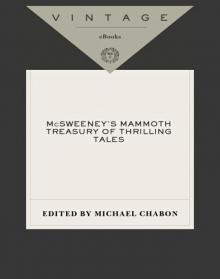 McSweeney's Mammoth Treasury of Thrilling Tales
McSweeney's Mammoth Treasury of Thrilling Tales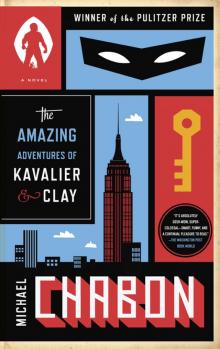 The Amazing Adventures of Kavalier & Clay
The Amazing Adventures of Kavalier & Clay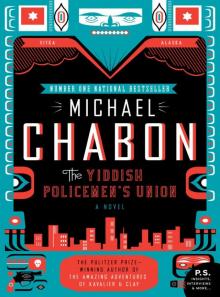 The Yiddish Policemen's Union
The Yiddish Policemen's Union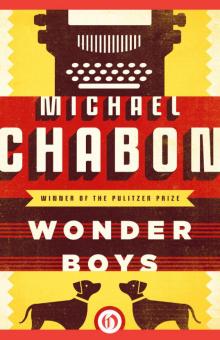 Wonder Boys
Wonder Boys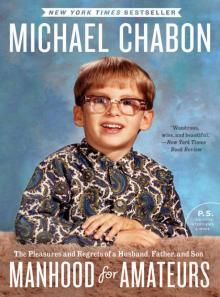 Manhood for Amateurs
Manhood for Amateurs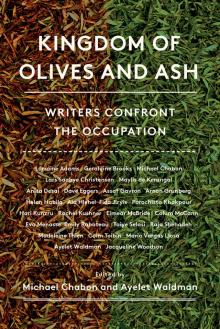 Kingdom of Olives and Ash: Writers Confront the Occupation
Kingdom of Olives and Ash: Writers Confront the Occupation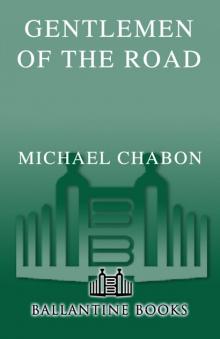 Gentlemen of the Road: A Tale of Adventure
Gentlemen of the Road: A Tale of Adventure A Model World and Other Stories
A Model World and Other Stories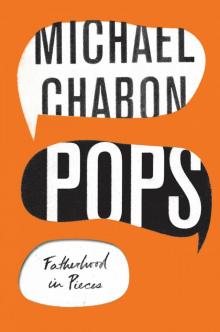 Pops: Fatherhood in Pieces
Pops: Fatherhood in Pieces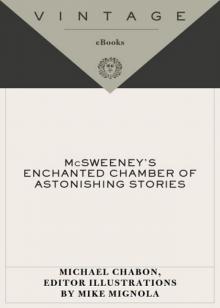 McSweeney's Enchanted Chamber of Astonishing Stories
McSweeney's Enchanted Chamber of Astonishing Stories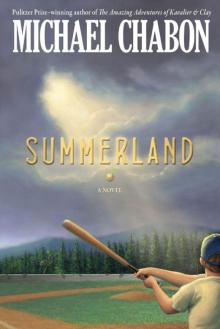 Summerland
Summerland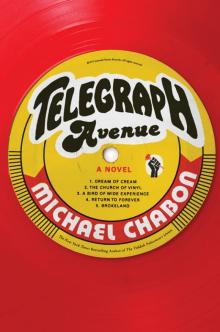 Telegraph Avenue
Telegraph Avenue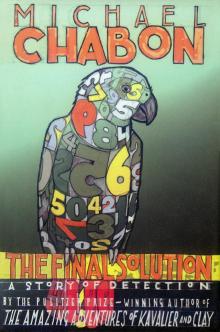 The Final Solution
The Final Solution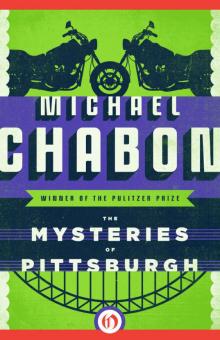 The Mysteries of Pittsburgh
The Mysteries of Pittsburgh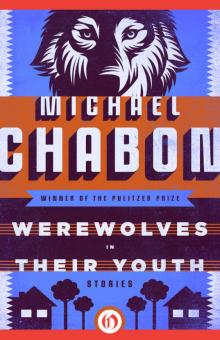 Werewolves in Their Youth
Werewolves in Their Youth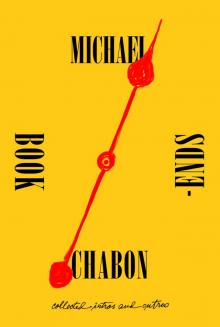 Bookends
Bookends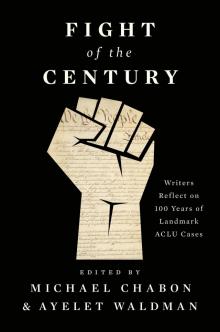 Fight of the Century
Fight of the Century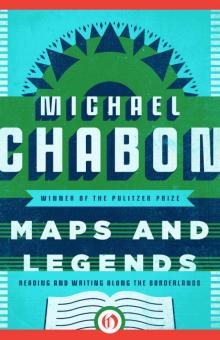 Maps and Legends
Maps and Legends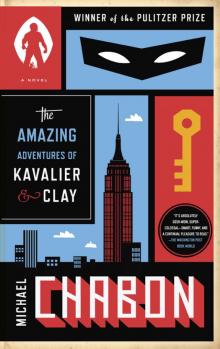 The Amazing Adventures of Kavalier & Clay (with bonus content)
The Amazing Adventures of Kavalier & Clay (with bonus content)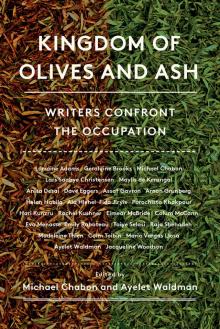 Kingdom of Olives and Ash
Kingdom of Olives and Ash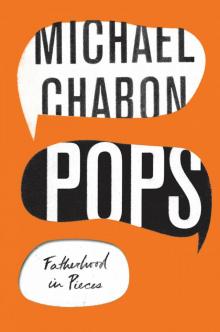 Pops
Pops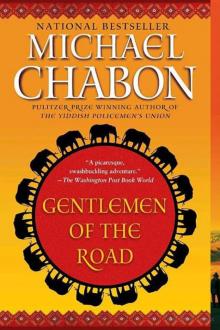 Gentlemen of the Road
Gentlemen of the Road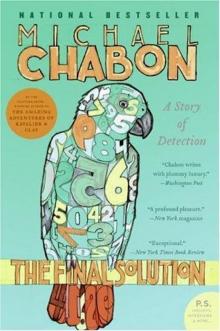 The Final Solution: A Story of Detection
The Final Solution: A Story of Detection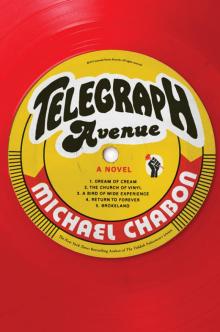 Telegraph Avenue: A Novel
Telegraph Avenue: A Novel